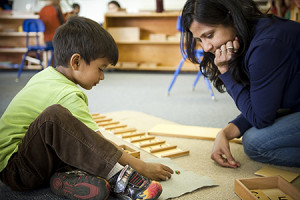Tracking Your Child’s Progress
Although most Montessori teachers do not assign grades, they closely observe each student’s progress and readiness to move on to new lessons. They may orally question a student about what she has learned, or ask her to teach the lesson to a fellow student. In some schools, students compile a portfolio of their work to demonstrate their competence in a variety of skills.
Most schools hold family conferences a few times a year so parents may see their child’s work and hear the teacher’s assessment. Teachers typically provide a written narrative that explains a student’s progress in relation to his own development and to developmental norms.
If your child attends a public Montessori school, you will probably be given information about her performance on standardized tests, which you can use to evaluate her progress against national norms. Some independent schools also administer standardized exams, particularly if they will be a requirement of schools into which their students will transition.
Some parents may wonder why Montessori doesn’t endorse grading, if only to motivate students to work hard. But grades, like other external rewards, have temporary effects at best. Instead, Montessori education nurtures a child’s intrinsic motivation to learn, create, and do satisfying work.

